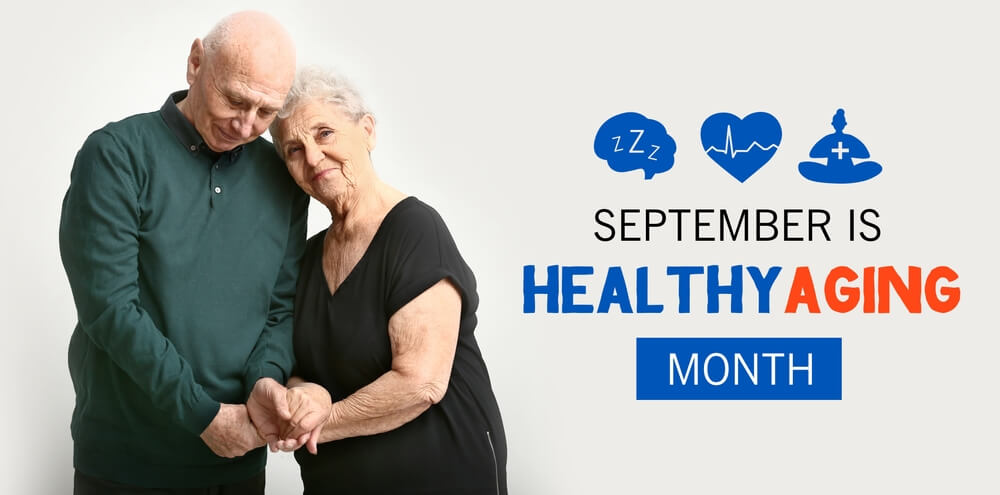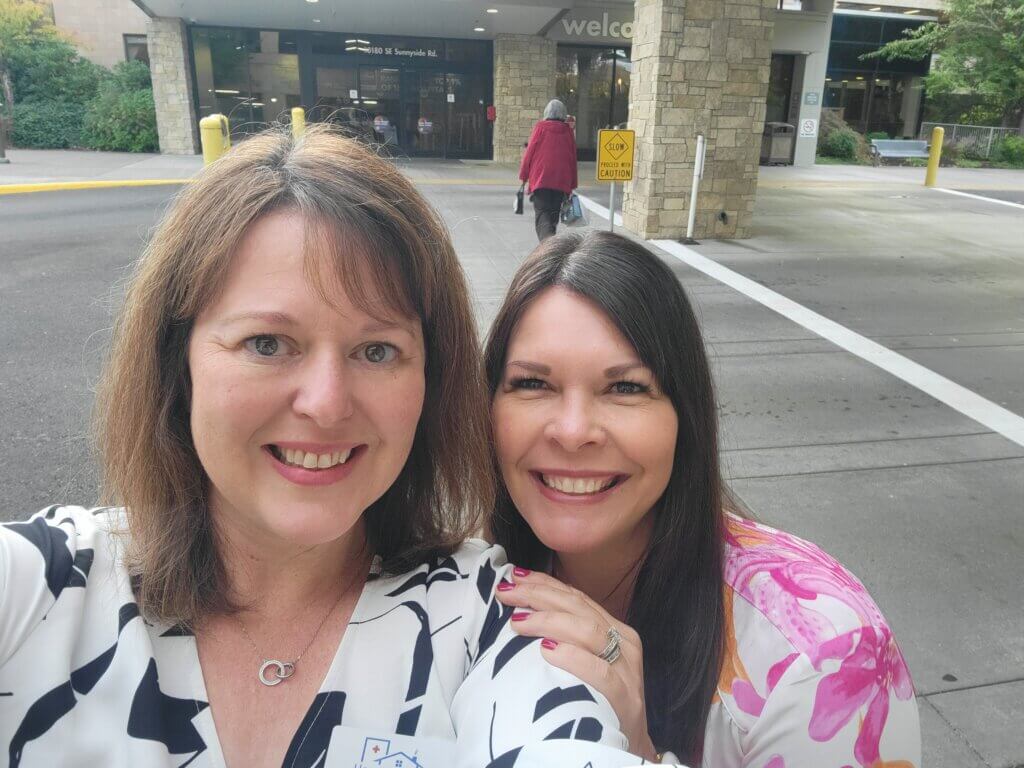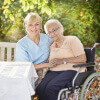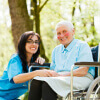September is Healthy Aging Month
As life expectancy continues to rise, the focus on promoting senior well-being has never been more critical. During Healthy Aging Month, we emphasize the importance of enhancing quality of life for our seniors. This initiative is not just about adding years to life, but more importantly, adding life to those years. By adopting a comprehensive approach to health and community, seniors can enjoy a more vibrant, fulfilling life. Let’s explore effective strategies for promoting senior well-being and longevity that can make a significant difference.
Nutrition for Longevity
The Role of a Balanced Diet in Senior Health
Nutrition plays a pivotal role in how we age. For seniors, eating a balanced diet means more than just managing weight—it’s about nourishing the body to ward off illnesses, sustain energy levels, and sharpen the mind. Foods rich in antioxidants, lean proteins, and essential fats can help combat malnutrition, enhance immune function, and support cognitive health. During Healthy Aging Month, it’s the perfect time to revisit dietary choices and ensure that meals are as nutritious as they are delicious.
- Plan meals with a variety of colors and textures to ensure a range of nutrients.
- Incorporate omega-3 fatty acids and fiber-rich foods to support heart and digestive health.
- Consult a nutritionist to tailor dietary needs to specific health conditions like diabetes or heart disease.
Importance of Hydration
Hydration is equally critical for maintaining senior health. Older adults are more susceptible to dehydration, which can exacerbate chronic illnesses and impact cognitive function. Encourage seniors to drink fluids regularly throughout the day, emphasizing the role of water, herbal teas, and other hydrating beverages.
- Keep a water bottle within easy reach to remind seniors to drink regularly.
- Flavor water with natural fruits or cucumbers for an appealing taste.
- Monitor fluid intake and ensure at least eight glasses a day, more if the weather is hot or if they are physically active.
Physical Activity for a Healthy Life
Safe and Effective Exercises for Seniors
Staying active is crucial at any age but becomes especially significant in later years. Regular exercise helps maintain independence among seniors by improving muscular strength, balance, and cardiovascular health. Activities like walking, gentle yoga, and water aerobics are not only safe for seniors but can also be enjoyable. These activities keep the body moving and the heart pumping, significantly enhancing overall well-being. This Healthy Aging Month, encourage the seniors in your life to integrate physical activity into their daily routine, tailored to their abilities and interests.
- Join community exercise programs tailored for seniors like Silver Sneakers.
- Incorporate balance exercises to reduce the risk of falls.
- Set small, daily exercise goals to build a routine without overwhelming.
Customizing Exercise Plans
It’s important to customize exercise plans to meet the unique physical capabilities and health conditions of each senior. Collaborate with healthcare providers to design safe, enjoyable, and effective exercise routines that cater to individual needs, whether it’s low-impact exercises for those with joint pain or more vigorous activities for those capable.
- Assess current fitness levels with a professional before starting any new exercise regimen.
- Consider physical therapy to address specific mobility limitations.
- Use wearable technology to monitor heart rate and activity levels during exercise.
Mental Health and Emotional Well-being
Maintaining Cognitive and Emotional Health
Mental and emotional health is as vital as physical health, particularly as we age. Seniors who engage in social activities, brain games, and creative hobbies are more likely to maintain their cognitive abilities and have better emotional health. Initiatives during Healthy Aging Month can include workshops, social meetups, and even virtual hangouts to keep seniors mentally active and emotionally connected. By fostering an environment that supports mental health, we can help seniors maintain a joyful and enriched life.
- Encourage regular social interaction with friends and family, even via digital means.
- Engage in mentally stimulating games like puzzles, chess, or crosswords.
- Create a routine that includes time for hobbies and creative outlets.
Encouraging Lifelong Learning
Promote lifelong learning opportunities such as classes, lectures, and book clubs that challenge the mind and stimulate intellectual engagement. These activities can boost cognitive function, provide a sense of achievement, and increase social interaction among seniors.
- Enroll in local or online courses on topics of interest.
- Visit museums, attend concerts, or go to plays to stimulate intellectual and cultural engagement.
- Participate in discussion groups or book clubs to foster intellectual discussions and social connections.
Preventative Care to Ward Off Disease
Regular Check-Ups and Screenings
Preventative care is the cornerstone of healthy aging. Regular medical check-ups, screenings, and vaccinations are essential to detect and treat problems early. Seniors should be encouraged to keep up with their health appointments, especially during Healthy Aging Month. This can be an opportune time to assess health needs, update vaccinations, and review medications to avoid complications later.
- Schedule annual wellness visits as part of a regular health maintenance routine.
- Keep a list of all medications and discuss them with a healthcare provider at each visit.
- Take advantage of community health fairs for convenient screenings.
Managing Chronic Conditions
Discuss the importance of managing chronic conditions through consistent medical oversight and lifestyle adjustments. Regular monitoring and adjustments in treatment plans can help control conditions such as diabetes, heart disease, and arthritis, reducing the risk of complications.
- Use medication management tools like pill organizers or mobile reminders to ensure adherence.
- Regularly review and adjust care plans based on health progression or regression.
- Stay informed about new treatments or management strategies for chronic conditions.
Fostering Community and Social Connections
The Impact of Social Engagement on Senior Health
Social connections are crucial for maintaining health in senior years, helping to prevent loneliness and depression. Community centers, senior clubs, and online groups can provide valuable social support. Healthy Aging Month is an excellent opportunity to promote events and activities that can bring seniors together, fostering a sense of belonging and community. Whether it’s through shared meals, group exercises, or cultural outings, strengthening social ties is a key aspect of aging healthily.
- Organize or attend regular meet-ups or social gatherings.
- Join local clubs or groups that focus on activities or hobbies of interest.
- Participate in community service projects to feel connected and valued.
Volunteer Opportunities for Seniors
Highlight the benefits of volunteerism, which can offer seniors a sense of purpose and community involvement. Encourage participation in local charities, schools, or other community organizations, which can provide meaningful connections and a productive outlet for their skills and experience.
- Find volunteer roles that match personal interests or past professional skills.
- Look for volunteer opportunities that can be performed from home if mobility is limited.
- Connect with other volunteers to build new friendships and expand social networks.
A Call to Action for Enhanced Senior Living
This Healthy Aging Month, let’s commit to promoting senior well-being by embracing these life-enhancing strategies. At Home Matters Caregiving, we are dedicated to supporting the journey towards a healthier, more active, and connected life for seniors. We encourage everyone—seniors, caregivers, family members—to engage with these tips and make well-being a priority. Together, we can help our loved ones look forward to years filled with vitality and happiness.
Home Matters Can Help
Contact us at 503-352-5634 for a free consultation to share the challenges you’re facing, and to learn how our personalized home care services can help you.
Home Matters Caregiving proudly serves the Beaverton area providing care for seniors wherever they call home.











